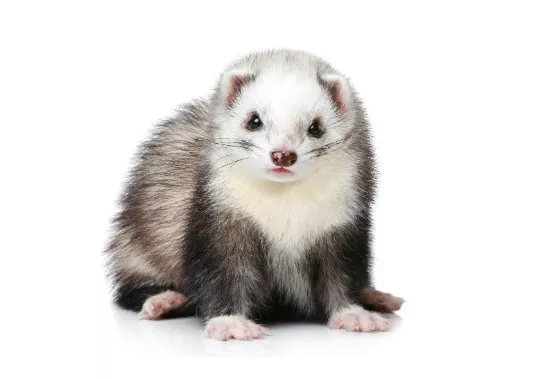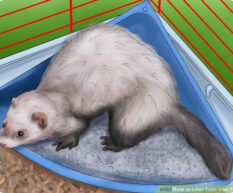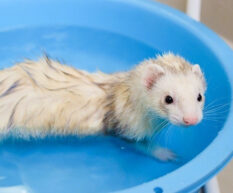Ferret News
Fat Ferrets: What You Need to Know about Ferrets and Weight Gain
By Dr. Rose-Anne Meissner, PhD

Excessive weight gain is uncommon in ferrets, but it can happen. Here is what you should know if your ferret seems to be gaining too much weight.
Poor nutrition and not enough activity can cause unhealthy weight gain
For this article, we are fortunate to have three vets offering their professional opinions. Dr. Leslie Pence and Dr. Gregory Rich both care for ferrets and other exotic animals at Avian & Exotic Animal Hospital of Louisiana. Dr. Angela Lennox sees her ferrety patients at the Avian and Exotic Animal Clinic of Indianapolis. Dr. Pence and Dr. Rich concur that feeding ferrets a low-quality cat food (which is too high in fat to be ideal for ferrets) and too many treats are common causes of weight gain. Dr. Pence cautions against offering ferrets peanut butter or fruit. Dr. Rich says that “offering Ferritone/Ferrivite or Dook Soup/Carnivore Care on a daily basis” can lead to weight gain.
Ferrets who have been hospitalized or are on long-term medications have unique risk factors that may affect their weight. Dr. Rich says, “We have several clients who have obese ferrets that had been in the hospital for some reason and even after the ferret is back to good health, they continue feeding Carnivore Care every day, then the ferret will not revert to kibble.” Dr. Pence points out that certain medications, such as long-term steroid treatment for insulinoma, can cause obesity.
Finally, for all ferrets, not getting enough exercise or daily activity can lead to weight gain.
Seasonal weight gain is normal
A healthy ferret may gain up to 10% of her body weight as summer wanes and the days get shorter. Ferrets are seasonal animals, which means their biology and behavior are strongly influenced by the annual passage of seasons. A ferret’s weight, coat, and reproductive cycle are all seasonal. If you have never had the privilege of seeing a ferret transformed for winter, you are in for a treat! It is normal for ferrets to gain weight and acquire a fluffy coat for winter. Mammals in general have a set of hormonal changes brought on by the days getting shorter in winter. In the autumn and winter, melatonin levels rise as a result of the shorter day length. Melatonin is thought to be involved in seasonal weight gain through its effects on the thyroid system. Melatonin is also likely involved in seasonal coat variation, which we wrote about in our article, “Getting Fluffy for Winter,” which was published as a reprint in Issue 13.
In ferrets and other Mustelids (the weasel family), melatonin binds to a structure in the brain called the pars tuberalis, which is part of the pituitary gland. Scientists have zeroed in on one particular gene, thyroid stimulating hormone beta subunit (TSHβ) as an output of melatonin’s action. Levels of TSHβ gene expression in the pars tuberalis are increased during long summer days. In other words, the absence of melatonin (during summertime) allows for higher levels of TSHβ. Higher levels of TSHβ drive a signaling pathway in the thyroid gland that encourages the animal to eat more and store body weight during the summer in preparation for winter.
Even with seasonal weight gain, Dr. Lennox advises, “A ferret should never have obvious fat under the skin, even in the winter.” Her clinic has a useful video on how to weigh your pet at home.
Pregnant ferrets will gain weight
Breeding ferrets is a serious commitment and responsibility. If you think your female ferret might be pregnant, hopefully you are ready for kits! All female ferrets either need to be spayed or mated (with a fertile male or a vasectomized male) because it’s a threat to their health if they remain in heat.
A ferret’s pregnancy can be confirmed as early as 12 days after conception. By days 14-16, a pregnant uterus can be sensed by palpation (though I would speculate this may be more difficult for someone without much experience). I had a difficult time finding guidelines around how much weight a ferret gains during pregnancy, and one resource even suggested ferrets may struggle to get enough nutrition during late pregnancy. In addition, nursing is very demanding on the mother’s body; some ferrets lose weight while nursing in order to keep up with their kits’ needs.
Pregnancy, birth, and caring for kits are difficult tasks for ferrets. A pregnant ferret needs to be under a vet’s care, and her human caretaker ought to be prepared for a difficult birth and/or season of nursing.
Weight gain can be a symptom of disease
Weight gain may be an important clue to disease in your ferret. Hypothyroidism, for example, can lead to weight gain, but Dr. Lennox cautions that it has not been well-documented in ferrets. In hypothyroidism, the thyroid gland is underactive. Since the thyroid’s main job is to regulate metabolic speed, an underactive thyroid in humans can cause fatigue, depression, weight gain, and other symptoms. In ferrets, clinical signs of hypothyroidism can include “lethargy, obesity, decreased activity, excessive sleeping, and rear leg weakness,” according to V. Bakthavatchalu et al. These authors write, “The pathogenesis of hypothyroidism in ferrets remains to be elucidated.” Dr. Lennox notes that it is not common, either.
In their practices, Dr. Pence and Dr. Rich have seen an enlarged spleen (splenomegaly) as a cause of weight gain and a distended abdomen. Dr. Rich says that the weight gain pattern “differs from the fat deposition when talking about high fat diets or feeding Carnivore Care to healthy ferrets.” Other diseases that can result in weight gain include cancers such as end stage adrenal gland neoplasia or lymphoma, according to Dr. Pence.
If your vet suspects that your ferret may have an underlying disease, she will run one or more diagnostic tests, including:
- A complete blood count (CBC) to assess the numbers for circulating platelets, red blood cells, and white blood cells.
- A biochemistry profile to look at internal health and organ function in your ferret.
- A urinalysis to test your ferret’s urine for signs of infection, metabolic condition, and damage to the kidneys.
- An ultrasound to look at the organs.
Be proactive to help your ferret maintain a healthy weight
In order to know if your ferret is maintaining a healthy weight, you should make sure your ferret is seen by a ferret knowledgeable vet for her annual exam. Dr. Rich explains, “From a health standpoint, a good physical exam will entail body condition, subcutaneous fat stores, and abdominal fat presence.”
The advice for helping your ferret stay healthy is basic: healthy food and ample exercise. Here are some specific tips to help you.
For ferrets who need to lose weight:
- Most ferrets don’t overeat, so it’s okay for them to have food available all the time. But for ferrets who do overeat, limit their feeding times to discourage overeating. Ask your vet for specific advice on meal times.
- Make your ferret “forage” for food by hiding their food in ferret-safe puzzles or throughout their enclosure.
- Limit treats, especially sugary treats (like raisins or brand-name treats) or fatty treats (like salmon oil).
For all ferrets:
- Give your ferret adequate time outside the cage! At a minimum, experts recommend 2-4 hours of time during which your ferret is allowed out of their cage. Be sure to give them access to the cage so they can have water and use the litter box as needed.
- Be sure to talk with your vet if you are concerned about your ferret’s weight.
Special thanks to Dr. Pence and Dr. Rich of Avian & Exotic Animal Hospital of Louisiana and Dr. Lennox of Avian and Exotic Animal Clinic of Indianapolis for their contributions to this article.
Further reading
Bakthavatchalu, V., Muthupalani, S., Marini, R.P., and J.G. Fox. “Endocrinopathy and Aging in Ferrets.” Veterinary Pathology, volume 53, issue 2. Published in 2016. Pages 349-365. (Scholarly article)
Ebling, Francis J.P. “On the Value of Seasonal Mammals for Underlying Mechanisms Underlying the Control of Food Intake and Body Weight.” Hormones and Behavior, volume 66, issue 1. Published in 2014. Pages 56-65. (Scholarly article)
Hanon, Elodie A., et al. “Ancestral TSH Mechanism Signals Summer in a Photoperiodic Mammal.” Current Biology, volume 18, number 5. Published in 2008. Pages 1147-1152. (Scholarly article)
“Hypothyroidism.” WebMD. Reviewed on 16 August 2019. https://www.webmd.com/women/hypothyroidism-underactive-thyroid-symptoms-causes-treatments#3. Accessed 16 November 2019. (Web page)
Jekl, Vladimir and Karel Hauptman. “Reproductive Medicine in Ferrets.” Veterinary Clinics: Exotic Animal Practice, volume 20. Published in 2017. Pages 629-663. (Scholarly article)




